动词详解+例句
- 格式:doc
- 大小:57.50 KB
- 文档页数:6
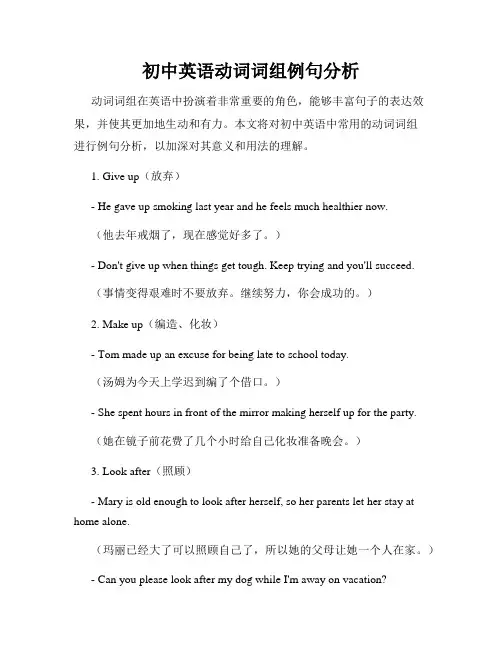
初中英语动词词组例句分析动词词组在英语中扮演着非常重要的角色,能够丰富句子的表达效果,并使其更加地生动和有力。
本文将对初中英语中常用的动词词组进行例句分析,以加深对其意义和用法的理解。
1. Give up(放弃)- He gave up smoking last year and he feels much healthier now.(他去年戒烟了,现在感觉好多了。
)- Don't give up when things get tough. Keep trying and you'll succeed.(事情变得艰难时不要放弃。
继续努力,你会成功的。
)2. Make up(编造、化妆)- Tom made up an excuse for being late to school today.(汤姆为今天上学迟到编了个借口。
)- She spent hours in front of the mirror making herself up for the party.(她在镜子前花费了几个小时给自己化妆准备晚会。
)3. Look after(照顾)- Mary is old enough to look after herself, so her parents let her stay at home alone.(玛丽已经大了可以照顾自己了,所以她的父母让她一个人在家。
)- Can you please look after my dog while I'm away on vacation?(我度假期间你能帮我照顾一下我的狗吗?)4. Set off(出发)- We will set off early tomorrow morning to avoid the traffic.(明天早上我们会早点出发以避开交通拥堵。
)- The fire alarm accidentally went off and caused a panic in the building.(火警意外触发了,导致建筑物内的人们惊慌失措。
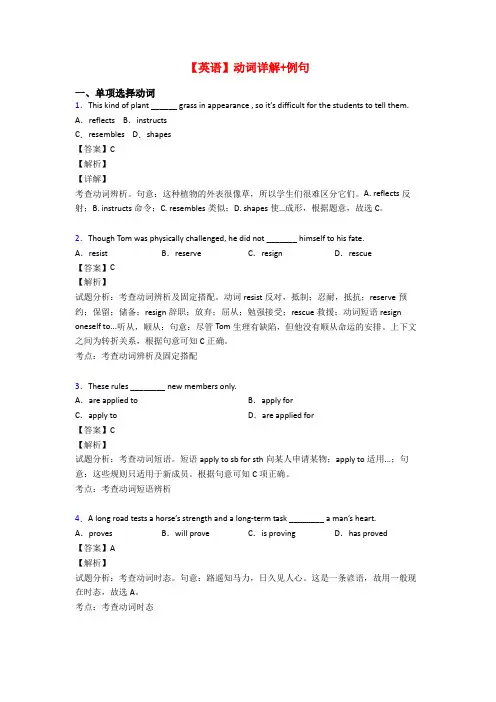
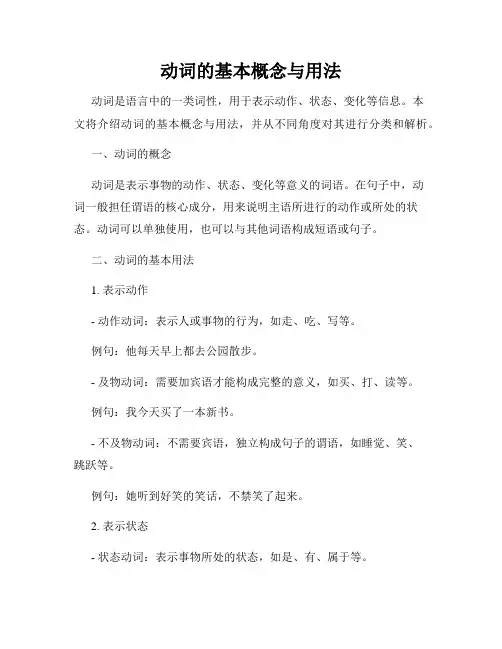
动词的基本概念与用法动词是语言中的一类词性,用于表示动作、状态、变化等信息。
本文将介绍动词的基本概念与用法,并从不同角度对其进行分类和解析。
一、动词的概念动词是表示事物的动作、状态、变化等意义的词语。
在句子中,动词一般担任谓语的核心成分,用来说明主语所进行的动作或所处的状态。
动词可以单独使用,也可以与其他词语构成短语或句子。
二、动词的基本用法1. 表示动作- 动作动词:表示人或事物的行为,如走、吃、写等。
例句:他每天早上都去公园散步。
- 及物动词:需要加宾语才能构成完整的意义,如买、打、读等。
例句:我今天买了一本新书。
- 不及物动词:不需要宾语,独立构成句子的谓语,如睡觉、笑、跳跃等。
例句:她听到好笑的笑话,不禁笑了起来。
2. 表示状态- 状态动词:表示事物所处的状态,如是、有、属于等。
例句:这个问题很复杂。
- 表示存在:表示事物存在的情况,如在、有等。
例句:我家里有一只小猫。
3. 表示变化- 变化动词:表示事物发生变化,如变成、变得等。
例句:他变得越来越自信。
- 关系动词:表示两者之间的关系,如是、有等。
例句:婚姻是一种美好的关系。
三、动词的时态和语态动词既可以表达时间的先后顺序,也可表示动作或状态的进行或完成。
1. 时态- 现在时态:表示现在或经常性的动作、状态或客观真理,如写、说等。
例句:他现在在写一篇短文。
- 过去时态:表示过去发生的动作或状态,如走、吃等。
例句:昨天我在公园里散步。
- 将来时态:表示将来要发生的动作或状态,如去、做等。
例句:明天我将去看电影。
2. 语态- 主动语态:表示主语执行动作的语态,如我吃饭、他唱歌等。
例句:我每天早上都吃饭。
- 被动语态:表示主语接受动作的语态,如饭被我吃、歌被他唱等。
例句:这首歌被他唱得很好听。
四、动词的形式变化动词在形式上会发生变化,根据时态、人称和数的差异,它们有不同的形式。
1. 时态变化动词的时态变化主要包括现在时、过去时和将来时的变形。

Phrasal Verbsaccountaccount for(tr)(为某事)给出充分的理由,圆满地解释(某种行为或某项支出),做出交代:A treasurer must account for the money he spends.财务负责人必须对他支付的款项做出交代。He has behavd in the most extraordinary way;I can’t account for hisactions at all/I can’t account for his behaving like that.他的行为极为奇怪,我完全无法解释他的行动/我无法为他那样的举动做出解释。allowallow for(tr)预先为某事留有余地,考虑到(常指某种额外的需要、支出、耽搁等):—It is 800 kilometres and I drive at 100 k.p.h., so I’ll be there in eighthours.—But you’ll have to allow for delays going through towns and for stopsfor refuelling.—距离是800公里,而我的车速是每小时100公里,因此我八小时后可以到那里。—可是你得把通过市镇和停车加油所耽搁的时间考虑进去。Allowing for depreciation your car should be worth£2,000 this timenext year.如果考虑到折旧,你的车明年此时应当值2,000英镑。answeranswer back(intr),answer somebody back反驳别人的责难,回嘴顶撞:Father:Why were you so late last night? You weren’t in till2 a.m.父亲:你昨晚回家为什么这么晚?你直到凌晨两点钟才回来。Son:You should have been asleep.儿子:那时候你本该睡着了。Father:Don’t answer me back.Answer my question.父亲:别跟我顶嘴。回答我的问题。askask after/for somebody 探询有关……的信息,(向第三者)问某人健康如何:I met Tom at the party;he asked after you.我在聚会上遇见了汤姆;他问你好。(问你健康如何/问你过得怎么样)ask for(a)寻找某人并想和他/她说话,要求见到某人:Go to the office and ask for my secretary.到办公室去,找我的秘书。(b)要求,索要:The men asked for more pay and shorter hours.工人们要求增加工资,减少工时。ask someone in(宾语在in之前)请某人进来:He didn’t ask me in;he kept me standing at the door while he read the message.他没有让我进去;他径自看那张条子,让我站在门口等着。ask someone out(宾语在out之前)请某人出去参加娱乐活动或吃饭(特别是在公众地方吃饭):She had a lot of friends and was usually asked out in the evenings,so she seldom spent an evening at home.她有很多朋友,晚上常被邀请外出,因此她晚上很少在家里呆着。backback away(intr)慢慢地退回去(因为遇到某种危险或不愉快的事):When he took a gun out everyone backd away nervously.他拿出枪来时,大家都紧张地向后退去。back out(intr)退出(某事先已同意的联合行动),停止或拒绝给予所允诺的帮助或支持:He agreed to help but backed out when he found how difficult it was.他本来同意给予帮助的,但在发现事情有多么困难之后就打退堂鼓了。back somebody up从道义上或行动上支持:The headmaster never backed up his staff.(backed them up)If a parentcomplained about a teacher he assumed that the teacher was in thewrong.校长从来不给教员们撑腰。凡是有家长给老师提意见时,他总是认为一定是老师不对。bebe against(tr)反对(常带动名词):I’m for doing nothing till the police arrive./I’m against doing anythingtill the police arrive.我赞成在警察来到以前不采取行动。/我反对在警察到来以前采取任何行动。be away(intr)(至少有一个晚上)不在家,不在某地be back(intr)在长期或短暂地离开之后回到原地:—I want to see Mrs Pitt.Is she in?—No,I’m afraid she’s out at the moment./No,I’m afraid she’s awayfor the weekend.—When will she be back?—She’ll be back in half an hour/next week.—我想见皮特夫人。她在吗?—不,恐怕她现在不在。/不,我想她外出度周末了。—她什么时候回来?—她半小时后/下周回来。be for(tr)赞成(常带动名词)be in(intr)在家或在某个建筑物内be in for(tr)将要遇上(常跟某种令人不愉快的事):Did you listen to the weather forecast? I’m afraid we’re in for a bumpyflight.你听气象预报没有?恐怕我们这次航班要很颠簸。If you think that the work is going to be easy you’re in for a shock.如果你以为这工作将容易,那么你可要大吃一惊了。be out(intr)短时间不在家/不在某个建筑物里,但并不在外过夜be over(intr)结束:The storm is over now;we can go on.暴风雨过去了;我们可以继续走了。be up(intr)起床了:Don’t expect her to answer the doorbell at eight o’clock on Sundaymorning.She won’t be up.星期日早上8点钟时,别指望她听见门铃响会来开门。她那时还没有起床呢。be up to(tr)体力或智力足以……(宾语常用it,但也可用动名词):After his illness the Minister continued in office though he was no longerup to the work/up to doing the work.部长生病后继续任职,但他已力不胜任了。be up to something/some mischief/some trick/no good从事或忙于某种调皮的、不正道的或有害的事/捣鬼:Don’t trust him;he is up to something/some trick.别信他;他在搞鬼/在耍诡计。The boys are very quiet.I wonder what they are up to.男孩子们无声无息了。我不知他们在捣什么鬼。注意:这里up to的宾语常是某一很不确定的词语,如上面例句所示。这个习语从来不与某一具体明确的事连用。it is up to someone(常带动词不定式)此事是某人的职责:It is up to the government to take action on violence.采取行动对付暴力行为,是政府职责所在。I have helped you as much as I can. Now it is up to you.我已尽我所能地帮助你了。现在该看你自己了。(你得靠自己的努力干下去。)bearbear out(tr)证实,提供证明:This report bears out my theory.(bears my theory out/bears it out)这报告证实了我的理论。bear up(intr)听到坏消息仍能勇敢支撑,掩饰感情或忧伤:The news of her death was a great shock to him but he bore up bravely and none of us realized how much he felt it.她故去的消息对他来讲是个打击,但他勇敢地支撑着,我们谁也没意识到他的感受该有多么强烈。blowblow out(tr)吹熄:The wind blew out the candle.(blew the candle out/blew it out)风吹灭了蜡烛。blow up(tr/intr)(a)用爆炸的方法毁灭,爆炸,被毁:They blew up the bridges so that the enemy couldn’t follow them.(blew the bridges up/blew them up)他们炸毁了桥,好让敌人不能追上他们。Just as we got to the bridge it blew up.我们刚到桥头,桥就炸掉了。(b)充气,打气,使膨胀:The children blew up their balloons and threw them into the air.( blew the balloons up/blew them up)孩子们把气球吹鼓了,扔向空中。boilboil away(intr)(液体)因沸腾而挥发完,熬干:I put the kettle on the gas ring and then went away and forgot about it.When I returned, the water had all boiled away and the flame had burnta hole in the kettle.我把壶放在煤气灶上,然后就走开把这事忘掉了。我回来时,水都烧干了,火把壶底烧出了一个窟窿。boil over(intr)(液体因沸腾而)溢到容器外面:The milk boiled over and there was a horrible smell of burning.牛奶潽了,烧糊的味道极为难闻。breakbreak down a door etc.用强力敲破或撞破:The firemen had to break down the door to get into the burning house.(break the door down/break it down)消防员不得不破门而入以便到着火的房子里边去。break down figures将一数目分别列在不同项目下以作进一步说明:You say that 10,000 people use this library.Could you break that downintoage-groups?你说有10,000人使用这所图书馆。你能否按年龄组将数字分解一下?(即说出有多少人是25岁以下的,有多少人是50岁以上的等等)break down(intr)由于有缺陷或强度不够而坏掉或不再正常运作:(a)常指人暂时感情支持不住:He broke down when telling me about his son’s tragic death.他向我谈到他儿子惨死的事时,不能自已了。(他失声痛哭了。)(b)指丧失精神上的抵抗力:At first he refused to admit his guilt but when he was shown the evidencehe broke down and confessed.起初他否认有罪,但给他看证据时,他招架不住而供认了。(c)指身体健康状况严重恶化:After years of overwork his health broke down and he had to retire.在多年劳累之后,他的身体垮了,只好退休。(d)常指机器坏了:The car broke down when we were driving through the desert and it tookus two days to repair it.我们驾车横越沙漠时,汽车坏了,花了两天才修好。(e)指交涉或谈判的破裂:The negotiations broke down because neither side would compromise.因为双方都不肯妥协,谈判破裂了。break in(intr), break into(tr)(a)用暴力强行进入:Thieves broke in and stole the silver.窃贼破门而入,偷走了银器。The house was broken into when the owner was on holiday.屋主外出度假时,有贼破门而入。(b)突然说话打断别人:I was telling them about my travels when he broke in with a story of hisown.我正在告诉他们我旅途中的事,他忽然插嘴讲起他自己的故事来。break in a young horse/pony etc.(tr)训练(马等)以供驾驭使用:You cannot ride or drive a horse safely before he has been broken in.在没有把马训练好以前,不管骑它还是用它驾车都是不安全的。break off(tr/intr)解开,破开,使分裂开或自己破裂开:He took a bar of chocolate and broke off a bit.(broke a bit off/broke itoff)他拿出一板巧克力,掰下了一小块。A piece of rock broke off and fell into the pool at the foot of the cliff.一块岩石断裂开,掉到悬崖脚下的池塘里。break off(tr)终止,停止,取消(常跟协议、协商或谈判等):Ann has broken off her engagement to Tom.(broken her engagement off/broken it off)安已经取消了同汤姆的婚约。break off(intr)突然停止说话,突然住口:They were in the middle of an argument but broke off when someonecame into the room.他们正争吵不休,但有人进屋时他们突然住口了。break out(intr)(a)开始,爆发(常用于诸如战争、流行病、火灾等不好的事):War broke out on 4 Angust.战争于8月4日爆发。(b)用暴力方法从监狱等地逃出:They locked him up in a room but he broke out.他们把他锁在一间屋里,可是他强行逃出了。(砸开门跑掉了)The police are looking for two men who broke out of prison last night.警方正在搜捕昨天晚上越狱逃跑的两名男子。break up(tr/intr)(使)瓦解,(使)解体:If that ship stays there she will break up/she will be broken up by thewaves. 那艘船如果停泊在那里,就会破的/会被浪头打散的。The old ship was towed away to be broken up and sold as scrap.那艘旧船被拖走以便拆散当废铁卖了。Divorce breaks up a lot of families.(breaks families up/breaks them up)离婚拆散了许多家庭。break up(intr)(用于学校的学期、会议、聚会等)散会,放假:The school broke up on 30 July and all the boys went home for the holi- days. 学校在7月30日放假了,男孩子们都回家度假去了。The meeting broke up in confusion.会议在一片混乱中散了。bringbring someone round(tr;宾语常位于round之前)(a)说服某人接受以前所反对的建议:After a lot of argument I brought him round to my point of view.在争辩了很久之后,我说服他转念同意了我的看法。(b)使恢复知觉:She fainted with the pain but a little brandy soon brought her round.她痛得昏厥了,但是一小点白兰地很快使她恢复了知觉。bring a person or thing round(tr;宾语常位于round之前)把人或物带到某人的住所去:I have finished that book that you lent me; I’ll bring it round(to yourhouse)tonight.你借给我的书我已经看完了;我今晚上把它带(到你家里)来。bring up(tr)(a)教育培养儿童:She brought up her children to be truthful.(brought her children up/brought them up)她教导她的孩子们要真诚无欺。(b)提起,谈到:At the last committee meeting,the treasurer brought up the question of raising the annual subscription.(brought the question up/brought it up)委员会上一次开会时,财务主管提出了提高会员年费的问题。burnburn down(tr/intr)(完全)焚毁(指建筑物):The mob burnt down the embassy.(burnt the embassy down/burnt it down)乱民把大使馆焚毁了。The hotel burnt down before help came.旅馆在援助到来以前就烧毁了。call1 call走访,拜访call at。走访一个地方:I called at the bank and arranged to transfer some money.我到银行去了一下,安排了款项过户的事宜。call for到一个地方去取物或接人:I am going to a pop concert with Tom.He is calling for me at eightso I must be ready then.我要和汤姆去听流行歌曲音乐会。他8点钟来接我,因此我必须届时准备好。Let’s leave our suitcases in the left luggage office and call for themlater on when we have the car.咱们可以把行李存放在行李暂存处,等以后有车用时再来取。call in(intr)同look in和口语化的drop in意思一样,是来访,来坐坐的意思:Call in/Look in on your way home and tell me how the interviewwent.你回家的路上来看我一下,告诉我面谈进行得如何。call on拜访某人:He called on all the housewives in the area and asked them to sign thepetition.他走访了这一地区的所有主妇,要求他们在请愿书上签名。2 call for/in/on的其他意思call for(tr)要求,需要(这里的主语常是一个不用来指人的单词或短语,如the situation形势/this sort of work这种工作/this此事等,宾语则常是一个表示某种性质的词,如courage勇气/patience耐心/a steady hand稳当不抖的手): The situation calls for tact.对付这一形势要有策略。You’ve got the job! This calls for a celebration.你得到这份工作了!这需要庆祝一下。但这里也可以用一个用来指人的主语:The workers are calling for strike action.工人们正要求采取罢工行动。The relations of the dead men are calling for an inquiry.死者们的亲属要求调查真相。call in a person/call a person in派人去找某人来/请某人来家服务(send for比call in更显得主语权势大,因此callin是更有礼貌的说法):It was too late to call in an electrician.(call an electrician i n/call him in)找电工来已太晚了。There is some mystery about his death; the police have been calledin.他的死有点儿蹊跷;已经去找警察来了。call on somebody(常带动词不定式)要某人做某事/要某人给予帮助(较为正式的提出要求的方式,主要用于正式场合或演讲中,意味着提出要求的人认为所号召的事是另一人的责任):The president called upon his people to make sacrifices for the good oftheir country.总统号召人民为祖国的利益做出牺牲。The chairman called on the secretary to read the minutes of the lastmeeting.主席要求秘书朗读上次会议的记录。3 call的其他词组call off(tr)取消尚未开始的事,放弃已在进行中的事:They had to call off the match as the ground was too wet to play on.(call the match off/call it off)因为场地太湿无法比赛,人们不得不取消这次比赛。When the fog got thicker the search was called off.雾愈来愈浓了,只得放弃了搜索。call out(tr)召唤某人出来处理外面的事(常用于指部队被召集走出营房对付民众骚乱):The police couldn’t control the mob so troops were called out.警察无法控制乱民,因此出动了军队。The Fire Brigade was called out several times on the night of 5 November to put out fires started by fireworks.11月5日晚上,消防队多次奉召出动,以扑灭因燃放焰火而引起的火灾。Doctors don’t much like being called out at night.医生们不太喜欢夜间出诊。call up(tr)(a)征去服兵役:In countries where there is conscription men are called up at the age of eighteen.(call up men/call men up/call them up)在实行征兵制的国家里,18岁的男子要应征服役。(b)给……打电话:I called Tom up and told him the news.(calld up Tom/called him up)我给汤姆打电话,把消息告诉他了。carenot to care about(tr)对……淡漠,不关心……:The professor said that he was interested only in research;he didn’t really care about students.教授说他只对研究感兴趣;他并不真的关心学生。care for(tr)(a)喜欢(很少用于肯定句):He doen’t care for films about war.他不喜欢战争影片。(b)照看(除被动态外,较少使用):The house looked well cared for(=had been well looked after/was ingood condition).房子看起来照管得很好。carrycarry on(intr)继续(常指工作或职责):I can’t carry on alone any longer;I’ll have to get help.我无法再一个人继续下去了;我得找人帮忙。carry on with(tr)与上用法相似:The doctor told her to carry on with the treatment.医生告诉她应该继续这种疗法。carry out(tr)履行(职责),服从(命令),执行(指令),(把威胁要做的事)付诸行动:You are not meant to think for yourself;you are here to carry out my or-ders.你们的职责不是自己思考;叫你们来这里是要你们执行我的命令。The Water Board carried out their threat to cut off our water supply.自来水公司董事会把他们的威胁付诸行动,停止供应我们水了。(他们威胁要这样做,也真的这样做了。)He read the instructions but he didn’t carry them out.他看了指示,但没有遵照执行。catchcatch up with(tr),catch up(tr/intr)赶上但没超过:I started last in the race but I soon caught up with the others.(caught themup/cautht up)我在赛跑中最后一个起跑,但不久就赶上了其他人。You’ve missed a whole term;you’ll have to work hard to catch up with the rest of the class.(catch them up/catch up)你缺了整整一学期的课,得努力学习以便赶上同班的其他人。cleanclean out(tr) a room/cupboard/drawer etc.彻底清理打扫(房间/碗柜/抽屉等):I must clean out the spare room.(clean the spare room out/clean it out)我得把那间备用房(客房)彻底清扫一下。clean up(tr) a mess, eg. anything spilt清扫(脏物,如撒出的东西):Clean up any spilt paint.(clean the spilt paint up/clean it up)如果有溅出来的油漆,把它收拾干净。clean up(intr)同上用法相同:These painters always clean up when they’ve finished.这几位油漆工完工之后总要把场地打扫干净。clearclear away(tr)把物件拿开以便腾出地方:Could you clear away these papers?(clear these papers away/clear them away)你能不能把这些文件清除开?clear away(intr)散开:The clouds soon cleared away and it became quite warm.云很快就散开了,天气变得相当暖和。clear off(intr)走开(指室外) clear out(intr)走开(指室内)二者都是口语用法;作为命令时这样说是相当不礼貌的:‘You clear off,’said the farmer angrily.‘You’ve no right to put your caravans in my field without even asking my permission.’“你们给我走开,”农民愤怒地说,“你们没有权利连我的许可都没征得就把住人的大篷车停在我的地里。”Clear out! If I find you in this building again,I’ll report you to the po-lice.走开!你要再到这幢建筑里来,我就将你报警了。clear out(tr)把(房间/碗柜/抽屉等)腾空以便放别的东西:I’ll clear out this drawer and you can put your things in it.( clear this drawer out/clear it out)我会把这个抽屉腾空,这样你就能把你的东西放在里面了。clear up(intr)有云或雨后天晴了:The sky looks a bit cloudy now but I think it will clear up.现在天看来有点阴,但我想天会晴的。clear up(tr/intr)收拾整齐干净:When you are cooking it’s best to clear up as you go,instead of leaving everything to the end and having a terrible pile of things to deal with.烹调时,最好是边干边收拾,而不要把活留到最后而剩下一大堆东西要打扫收拾。Clear up this mess.(clear this mess up/clear it up)把这堆乱糟糟的东西收拾干净。clear up(tr)(a)完成(某种尚待完成的工作):I have some letters which I must clear up before I leave tonight.有几封信我今天晚上走以前必须写完。(b)侦破(不可思议的怪事、案件等):In a great many detective stories when the police are baffled an amateurdetective comes along and clears up the mystery.(clears it up)在许多侦探小说中,当警察束手无策时,来了个业余侦探,把案子给破了。closeclose down(tr/intr)永远关闭,停业(指商店或买卖等):Trade was so bad that many small shops closed down and big shops closedsome of their branches down.(closed down some branches/closed themdown) 市面很差,许多小店停业了,大商店也关了一些分店。close in(intr)逼近,从四面凑近(常用于雾、夜色、敌人等):As the mist was closing in we decided to stay where we were.由于雾越来越逼近,我们决定留在原地不动。close up(intr)缩小间距(指一行人):If you children closed up a bit there’d be room for another one on thisseat.你们几个孩子要是挤一挤,这座位上还能加一个人。comecome across/upon(tr)碰巧发现,碰巧找到:When I was looking for my passport I came across these old photographs.我在找护照时碰巧找到了这些旧相片。come along/on(intr)和我一起来,陪伴我去(常用来敦促犹豫不决的人或拖拖拉拉的人):Come on,or we’ll be late.快点,否则我们要迟到了。come away(intr)(和我一起)走/离开:Come away now, It’s time to go home.快走吧。该回家了。come away/off(intr)自行脱落:When I pickd up the teapot the handle came away in my hand.我拿起茶壶时,茶壶掉了而只剩茶壶柄在我手里。come in(intr),come into( tr)进入:Someone knocked at my door and I said,‘Come in.’有人敲我的门,我说:“进来。”Come into the garden and I’ll show you my roses.到花园里来,我给你看我的玫瑰花。come off(intr)(a)(计划或阴谋)成功(用于否定句):I’m afraid that scheme of yours won’t come off.It needs more capitalthan you have available.恐怕你那个计划不会成功。它需要的投资不是你能拿得出来的。(b) 发生,按预先安排的那样发生:—When is the wedding coming off?—Next June.—婚礼什么时候举行?—6月份。如果我们说The duchess was to have opened the bazaar(公爵夫人本来是要为义卖主持开幕仪式的),我们的意思是说计划是那样订的,但没有实现(她本安排好要去为它揭幕,但后来不得不取消这一安排)。(c)(话剧、展览等)结束一轮演出或展出:‘Lady windermere’s Fan’is coming off next week.You’d better hurryif you want to see it.《少奶奶的扇子》下周要结束演出了。你要想看的话得抓紧点。come out(intr)(a)被揭露或发觉(这里的主语常是the truth真相/the facts事实/the whol story 全部内情等;并且一般指有关人士想竭力掩盖的事实即丑闻等):They deceived everybody till they quarrelled among themselves;then onepublicly denounced the others and the whole truth came out.他们把大家都骗了,直到后来内讧起来,其中一个人公开揭发了别人,这才真相大白。(b)(书籍)发行:Her new novel will be coming out in time for the Christmas sales.她的新小说将赶在圣诞节购物潮时发行。(c)(污渍)消除,洗掉:Tomato stains don’t usually come out.西红柿污渍一般洗不净。come round(intr)(a)终于接受以前所反对的建议:Her father at first refused to let her study abroad but he came round(to it)in the end.她父亲起初反对她去外国念书,但终于回心转意了。(他说可以让她去。)(b)到某人的家里来:I’ll come round after dinner and tell you the plan.我晚饭后来转一下,把计划说给你听。come round/to(intr;to重读) 恢复知觉:When we found him he was unconscious but he came round/to in half anhour and explained that he had been attacked and robbed.我们发现他时他已失去知觉,但是半小时后他恢复了知觉,说他遭到殴打抢劫。come up(intr)(a) 升到水面,生长出来:A diver with an aqualung doesn’t have to keep coming up for air;he canstay underwater for quite a long time.备有潜水供氧器的潜水员无需不断升出水面呼吸;他可以在水下停留相当长的时间。Weeds are coming up everywhere.杂草到处蔓生。(b)被提到:The question of the caretaker’s wages came up at the last meeting.在上次会议中提到了看楼人的工资问题。come up(intr),come up to(tr)走近,来到能说话的近处:A policeman was standing a few yards away.He came up to me and said,‘You can’t park here.’几码外站着一位警察。他走过来并对我说:“你不能把车子停放在这里。”cropcrop up(intr)出现,意外地或偶然地出现(主语常是一个抽象名词如difficulties 困难/the subject题目或是一个代词):At first all sorts of difficulties cropped up and delayed ter we learnthow to anticipate these.起初冒出来了各式各样的困难,耽搁了我们。后来我们学会了如何为这些困难预作准备。cutcut down a tree 砍倒树木:If you cut down all the trees you will ruin the land.(cut the trees down/ cut them down)你要是砍倒所有的树木,就会把土地给毁了。cut down(tr) 减少数量:We must cut down expenses or we’ll be getting into debt.我们得减少支出,否则就要负债了。‘This article is too long,’said the editor.‘Could you cut it down to2,000 words?’“这篇文章太长了,”编辑说,“你能不能把它缩到两千字?”cut in(intr)在车距极近的不安全情况下并行抢道并插到另一辆车前面:Accidents are often caused by drivers cutting in.车祸常由司机抢道插到别的车前面而引起。cut off(tr)切断、停止供应(宾语可以是水、电、煤气,也可以是被停供的人):The Company has cut off our electricity supply because we haven’t paidour bill.(cut our supply off/cut it off)因为我们没有付电费,公司断了我们的电。They’ve cut off the water/our water supply temporarily because they arerepairing one of the main pipes.他们暂时断了我们的水源,因为在修其中的一条主要的水管。We were cut off in the middle of our(telephone)conversation.我们(电)话还没完,就被掐断了。(这可能是偶然的事,也可能是电话接线员故意的行为。)cut someone off阻挡某人使其不能逃到安全地带(常用于指潮水围困,特别是用被动态时):We were cut off by the tide and had to be rescued by boat.我们被潮水困住了,只好由小船搭救出来。be cut off(intr)被隔绝在不方便的地方(主语常是某一地方或住在某一地方的人):You will be completely cut off if you go to live in that village becausethere is a bus only once a week.你要是去住在那个村里,就会与世隔绝了,因为那里每周只有一班公共汽车。cut out(tr)(a)从布、纸等上弄下所需形状:When I am making a dress I mark the cloth with chalk and then cut itout.(cut out the dress/cut the dress out)我缝衣服时先用白粉在布上画出样子,然后再剪下。Young people often cut out photographs of their favourite pop stars andstick them to the walls.年轻人常把最喜欢的流行歌手的相片剪下来贴在墙上。(b)略去,排除,不再继续:If you want to get thin you must cut out sugar.(cut it out)你要是想瘦点,就得不吃糖。be cut out for(tr)特别适合于……(用于指人,又常用于否定句中):His father got him a job in a bank but it soon became clear that he wasnot cut out for that kind of work.他爸爸给他在银行里找了一个工作,但是不久就可以清楚地看出来,他不适合干那种工作。cut up(tr) 切、割、剪成碎片:They cut down the tree and cut it up for firewood.(cut the tree up/cut up the tree)他们把树砍倒并劈碎当柴火了。diedie away(intr)(声音)逐渐微弱直到听不到:They waited till the sound of the guard’s footsteps died away.他们一直等到警卫的脚步声消逝了。die down(intr)逐渐平静下来,直至平息(常指骚乱、火、心情的一阵波动等):When the excitement had died down the shopkeepers took down theirshutters and reopened their shops.波动平息后,店主们取下了窗板,重新开店营业。die out(intr)绝灭,成为过去(常指风俗、种族、动物品种等):Elephants would die out if men could shoot as many as they wished.如果人们爱猎杀多少大象就可以猎杀多少,大象就会灭种了。dodo away with(tr)废除:。
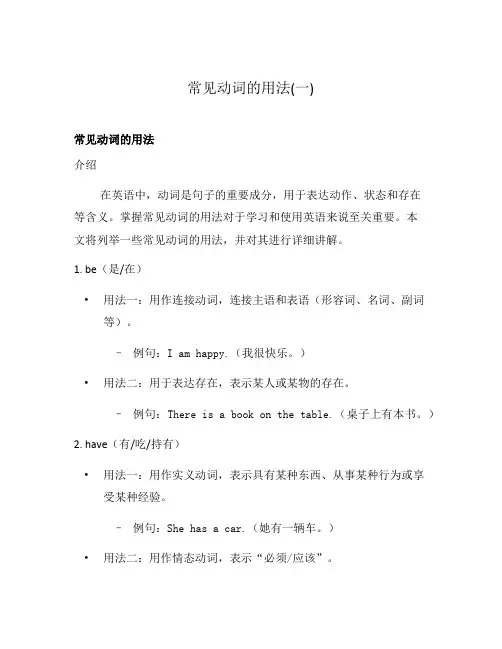
常见动词的用法(一)常见动词的用法介绍在英语中,动词是句子的重要成分,用于表达动作、状态和存在等含义。
掌握常见动词的用法对于学习和使用英语来说至关重要。
本文将列举一些常见动词的用法,并对其进行详细讲解。
1. be(是/在)•用法一:用作连接动词,连接主语和表语(形容词、名词、副词等)。
–例句:I am happy.(我很快乐。
)•用法二:用于表达存在,表示某人或某物的存在。
–例句:There is a book on the table.(桌子上有本书。
)2. have(有/吃/持有)•用法一:用作实义动词,表示具有某种东西、从事某种行为或享受某种经验。
–例句:She has a car.(她有一辆车。
)•用法二:用作情态动词,表示“必须/应该”。
–例句:You have to finish your homework.(你必须完成你的作业。
)3. do(做)•用法一:用作实义动词,表示进行或完成某个动作。
–例句:What are you doing?(你在做什么?)•用法二:用作助动词,帮助构成疑问句和否定句。
–例句:Do you like ice cream?(你喜欢冰淇淋吗?)4. go(去/进行)•用法一:用作实义动词,表示移动到某个位置或进行某个活动。
–例句:We are going to the park.(我们要去公园。
)•用法二:用作情态动词,表示“可以/会”。
–例句:I can go swimming tomorrow.(明天我可以去游泳。
)5. make(制作/做/使)•用法一:用作实义动词,表示制作、做或创建某物。
–例句:She made a cake for her birthday.(她为自己的生日做了一个蛋糕。
)•用法二:用作情态动词,表示“强迫/使得”。
–例句:The teacher makes the students study hard.(老师让学生们努力学习。
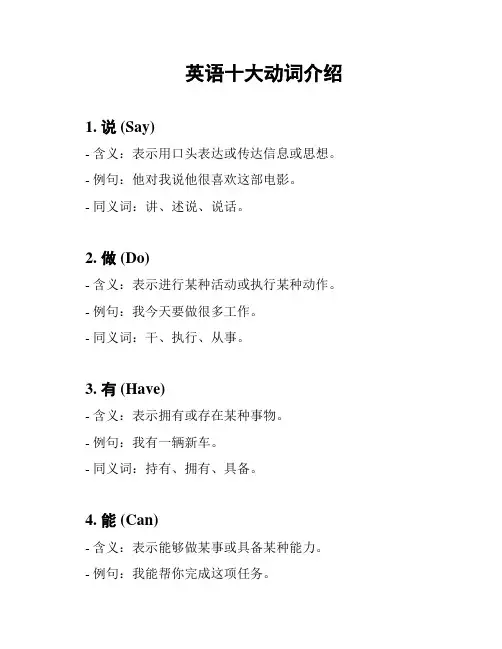
英语十大动词介绍1. 说 (Say)- 含义:表示用口头表达或传达信息或思想。
- 例句:他对我说他很喜欢这部电影。
- 同义词:讲、述说、说话。
2. 做 (Do)- 含义:表示进行某种活动或执行某种动作。
- 例句:我今天要做很多工作。
- 同义词:干、执行、从事。
3. 有 (Have)- 含义:表示拥有或存在某种事物。
- 例句:我有一辆新车。
- 同义词:持有、拥有、具备。
4. 能 (Can)- 含义:表示能够做某事或具备某种能力。
- 例句:我能帮你完成这项任务。
- 同义词:可以、有能力、会。
5. 去 (Go)- 含义:表示离开或移动到某个地方。
- 例句:我经常去公园散步。
- 同义词:走、去往、前往。
6. 得到 (Get)- 含义:表示获得或取得某种事物。
- 例句:他终于得到了他一直想要的工作。
- 同义词:取得、获得、收到。
7. 看 (See)- 含义:表示用眼睛观察或察看某物。
- 例句:我看到了一只小猫在花园里玩耍。
- 同义词:观看、望、瞧。
8. 知道 (Know)- 含义:表示了解或掌握某种信息。
- 例句:我知道今天是你的生日。
- 同义词:理解、认识、晓得。
9. 想 (Think)- 含义:表示思考或认为某事。
- 例句:我想明天会下雨。
- 同义词:思考、考虑、认为。
10. 爱 (Love)- 含义:表示深情地喜欢或在感情上关心某人或某物。
- 例句:我爱我的家人。
- 同义词:喜爱、热爱、钟爱。
以上是英语中的十个常用动词介绍。
这些动词在交流和写作中非常常见,对于研究和使用英语语言至关重要。
同时,通过合适的方式练和应用这些动词,可以提升英语表达的准确性和流畅度。
注意:以上解释仅供参考,语境和用法可能有所变化。
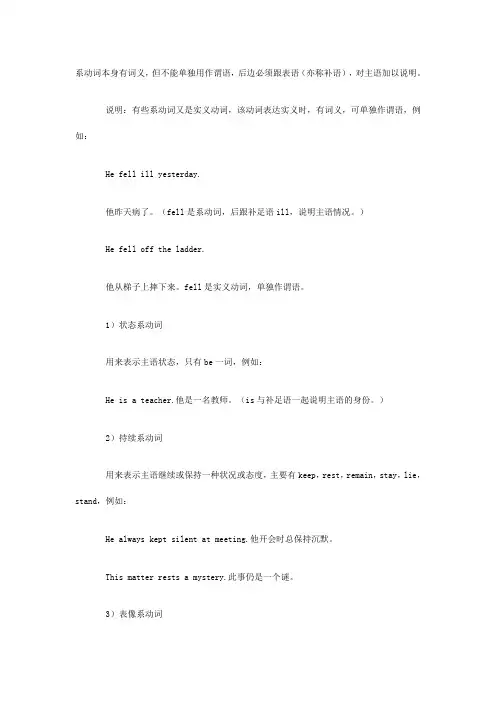
系动词本身有词义,但不能单独用作谓语,后边必须跟表语(亦称补语),对主语加以说明。
说明:有些系动词又是实义动词,该动词表达实义时,有词义,可单独作谓语,例如: He fell ill yesterday.他昨天病了。
(fell是系动词,后跟补足语ill,说明主语情况。
)He fell off the ladder.他从梯子上摔下来。
fell是实义动词,单独作谓语。
1)状态系动词用来表示主语状态,只有be一词,例如:He is a teacher.他是一名教师。
(is与补足语一起说明主语的身份。
)2)持续系动词用来表示主语继续或保持一种状况或态度,主要有keep,rest,remain,stay,lie,stand,例如:He always kept silent at meeting.他开会时总保持沉默。
This matter rests a mystery.此事仍是一个谜。
3)表像系动词用来表示"看起来像"这一概念,主要有seem,appear,look,例如:He looks tired.他看起来很累。
He seems (to be)very sad.他看起来很伤心。
4)感官系动词感官系动词主要有feel,smell,sound,taste,例如:This kind of cloth feels very soft.这种布手感很软。
This flower smells very sweet.这朵花闻起来很香。
5)变化系动词这些系动词表示主语变成什么样,变化系动词主要有become,grow,turn,fall,get,go,come,run.例如:He became mad after that.自那之后,他疯了。
She grew rich within a short time.她没多长时间就富了。
6)终止系动词表示主语已终止动作,主要有prove,trun out,表达"证实","变成"之意,例如:The rumor proved false.这谣言证实有假。
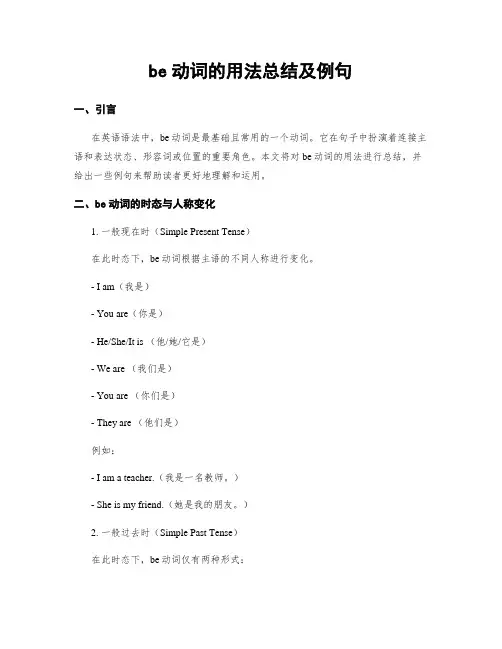
be动词的用法总结及例句一、引言在英语语法中,be动词是最基础且常用的一个动词。
它在句子中扮演着连接主语和表达状态、形容词或位置的重要角色。
本文将对be动词的用法进行总结,并给出一些例句来帮助读者更好地理解和运用。
二、be动词的时态与人称变化1. 一般现在时(Simple Present Tense)在此时态下,be动词根据主语的不同人称进行变化。
- I am(我是)- You are(你是)- He/She/It is (他/她/它是)- We are (我们是)- You are (你们是)- They are (他们是)例如:- I am a teacher.(我是一名教师。
)- She is my friend.(她是我的朋友。
)2. 一般过去时(Simple Past Tense)在此时态下,be动词仅有两种形式:- Was(过去式第一人称单数和第三人称单数)- Were(其余情况)例如:- I was tired yesterday.(我昨天很累。
)- They were not happy with the result.(他们对结果不满意。
)3. 现在进行时(Present Continuous Tense)此时态表示当前正在进行的行为或临时状态。
be动词的构成:am/is/are + 现在分词例如:- He is studying in the library.(他正在图书馆学习。
)- We are not playing football now. (我们现在不在踢足球。
)4. 过去进行时(Past Continuous Tense)过去进行时表示过去某个具体时间内正在进行的行为。
be动词的构成:was/were + 现在分词例如:- She was watching TV at 8 p.m. last night.(昨晚八点她正在看电视。
)- They were not working when I called them.(我给他们打电话时,他们不在工作。
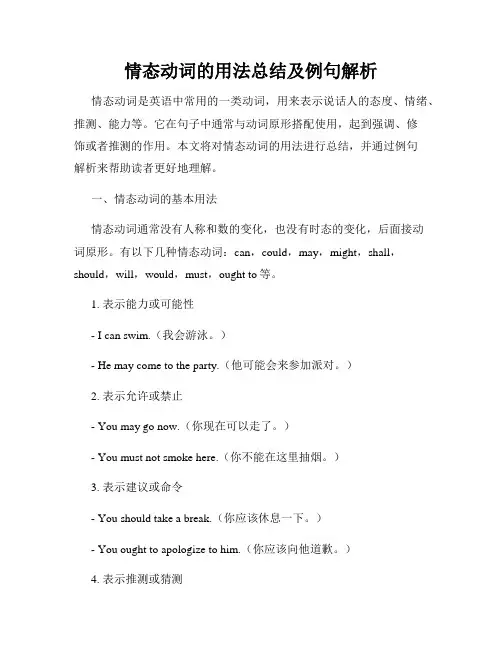
情态动词的用法总结及例句解析情态动词是英语中常用的一类动词,用来表示说话人的态度、情绪、推测、能力等。
它在句子中通常与动词原形搭配使用,起到强调、修饰或者推测的作用。
本文将对情态动词的用法进行总结,并通过例句解析来帮助读者更好地理解。
一、情态动词的基本用法情态动词通常没有人称和数的变化,也没有时态的变化,后面接动词原形。
有以下几种情态动词:can,could,may,might,shall,should,will,would,must,ought to等。
1. 表示能力或可能性- I can swim.(我会游泳。
)- He may come to the party.(他可能会来参加派对。
)2. 表示允许或禁止- You may go now.(你现在可以走了。
)- You must not smoke here.(你不能在这里抽烟。
)3. 表示建议或命令- You should take a break.(你应该休息一下。
)- You ought to apologize to him.(你应该向他道歉。
)4. 表示推测或猜测- He could be there.(他可能在那里。
)- It might rain tomorrow.(明天可能会下雨。
)5. 表示义务或必须- We must finish the project on time.(我们必须按时完成这个项目。
)- You ought to help him.(你应该帮助他。
)二、情态动词的细分用法除了以上的基本用法外,情态动词还有一些特殊的用法,需要注意其具体含义和用法。
1. can 和 could- 表示能力和技能:I can play the piano.(我会弹钢琴。
)- 表示请求或许可:Can I use your computer?(我可以用你的电脑吗?)- could 还可以用来表示过去的能力或许可:When I was young, I could run very fast.(小时候,我跑得很快。

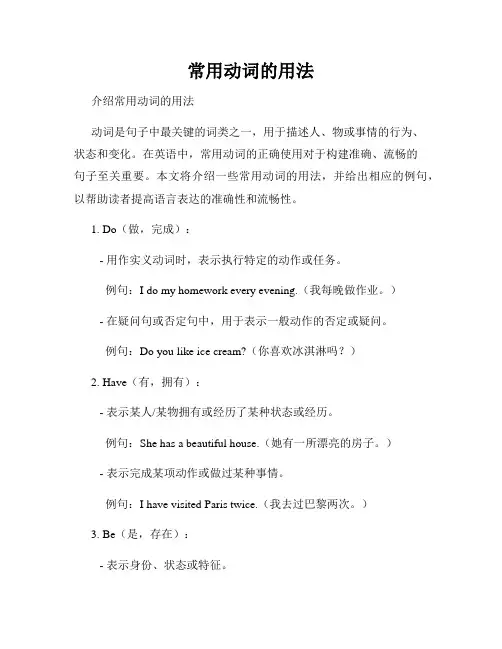
常用动词的用法介绍常用动词的用法动词是句子中最关键的词类之一,用于描述人、物或事情的行为、状态和变化。
在英语中,常用动词的正确使用对于构建准确、流畅的句子至关重要。
本文将介绍一些常用动词的用法,并给出相应的例句,以帮助读者提高语言表达的准确性和流畅性。
1. Do(做,完成):- 用作实义动词时,表示执行特定的动作或任务。
例句:I do my homework every evening.(我每晚做作业。
) - 在疑问句或否定句中,用于表示一般动作的否定或疑问。
例句:Do you like ice cream?(你喜欢冰淇淋吗?)2. Have(有,拥有):- 表示某人/某物拥有或经历了某种状态或经历。
例句:She has a beautiful house.(她有一所漂亮的房子。
) - 表示完成某项动作或做过某种事情。
例句:I have visited Paris twice.(我去过巴黎两次。
)3. Be(是,存在):- 表示身份、状态或特征。
例句:I am a student.(我是一名学生。
)- 表示存在或位置。
例句:The book is on the table.(书在桌子上。
)4. Go(去,进行):- 表示移动到某个地方。
例句:I want to go to the park.(我想去公园。
)- 表示进行某种活动。
例句:She goes swimming every weekend.(她每个周末去游泳。
)5. Make(制作,做):- 表示创造、制造或完成某件事情。
例句:She makes delicious cakes.(她做出美味的蛋糕。
) - 表示强迫或引起某种情感或感觉。
例句:The movie makes me feel sad.(这部电影让我感到悲伤。
)6. Take(拿,带):- 表示获取、接受或拿走某物。
例句:Can you take this package for me?(你能帮我拿这个包裹吗?)- 表示进行某种行动或采取某种方式。
常见动词的词义辨析与用法动词是语言中最常用、最基本的词类之一。
在英语中,一个动词可能有多个词义,这就需要我们进行准确的辨析,并根据不同的语境合理运用。
本文将探讨一些常见动词的词义辨析与用法,帮助读者更好地理解和运用这些动词。
一、Do与Make1. Do 表示完成某项动作或任务,强调的是行为的执行。
常见搭配有do homework(做作业)、do the dishes(洗碗)、do exercise(做运动)等。
例句:I need to do my homework before going out.2. Make 强调“制造”“创造”“构建”等意义,常与名词搭配使用。
如make a cake(做蛋糕)、make a decision(做决定)、make a plan(制定计划)等。
例句:I'm going to make a plan for our trip.二、Say与Tell1. Say 表示说话、陈述,常以直接引语或间接引语的形式出现。
如say hello(说你好)、say sorry(道歉)、say something(说些什么)等。
例句:She said she would come to the party.2. Tell 强调通过口头或书面传达信息,后接人作宾语。
如tell a story (讲故事)、tell a joke(讲笑话)、tell someone the truth(告诉某人真相)等。
例句:He told me an interesting story yesterday.三、Bring与Take1. Bring 意为“带来”,强调向说话人所在的地方移动。
如bring a book(带一本书来)、bring an umbrella(带把伞来)等。
例句:Could you bring me a glass of water?2. Take 意为“带走”,强调离开说话人所在的地方移动。
动词用法归纳总结动词是语言中最常用的词类之一,它用于表示人、事物或观念的动作、状态或发展等。
正确地使用动词对于表达清晰准确的意思,以及构建流畅的句子非常重要。
本文将对动词的用法进行归纳总结。
一、动词的分类根据词义和用法,动词主要分为以下几类:1. 及物动词:需要加宾语才能构成完整句子的动词,如“写”、“喜欢”等。
例句:“我写了一封信。
”、“他喜欢读书。
”2. 不及物动词:不需要加宾语就能构成完整句子的动词,如“走”、“跳”等。
例句:“他每天早上跑步。
”、“小猫在屋子里走来走去。
”3. 连系动词:用于连接主语与宾语或补语,表示主语的状态、性质、身份等,如“是”、“变得”等。
例句:“那个女孩子是我的妹妹。
”、“他变得越来越自信。
”二、动词的时态1. 一般现在时:表示现在常态、客观真理或经常性动作,常与频率副词连用。
例句:“我每天早上骑车上班。
”、“太阳从东方升起。
”2. 现在进行时:表示当前进行或发生的动作,常与现在时间状语连用。
例句:“他正在写一封电子邮件。
”、“我现在正在读一本小说。
”3. 一般过去时:表示过去发生的动作或状态,常与过去的时间状语连用。
例句:“昨天我去了北京旅游。
”、“我们在学校度过了美好的时光。
”4. 过去进行时:表示过去正在进行或发生的动作,常用来描述过去的背景。
例句:“我昨天下午一直在和朋友聊天。
”、“在我读书的时候,他一直在做家务。
”5. 一般将来时:表示将来某个时间要发生的动作,常与表示将来的时间状语连用。
例句:“我明天要去看电影。
”、“明年我将要开始新的工作。
”6. 进行将来时:表示将来某个时间正在进行的动作,通常强调未来计划或安排。
例句:“下个月我们将在海滩度假。
”、“明天我会在家里整理房间。
”三、动词的语态1. 主动语态:表示主语是动作的执行者。
例句:“她给我写了一封信。
”、“他们修建了一座新桥。
”2. 被动语态:表示主语是动作的承受者,强调动词的动作影响主语。
例句:“这本书被他读完了。
50个常用的动词以及简单的例句:Run (跑步) - She likes to run in the park.Eat (吃) - They eat breakfast together every morning.Drink (喝) - He drinks coffee to wake up in the morning.Write (写) - She writes a novel in her free time.Read (读) - He reads a book every night before bed.Watch (看) - They like to watch movies on the weekends.Listen (听) - He enjoys listening to music while working.Speak (说话) - She speaks three languages fluently.Study (学习) - The students study for their exams.Dance (跳舞) - She loves to dance.Play (玩) - The children play in the park every day.Work (工作) - She works at a company downtown.Drive (开车) - He likes to drive his car on the weekends.Cook (烹饪) - She is a great cook and loves to make delicious food. Sing (唱歌) - He has a beautiful voice and likes to sing.Travel (旅行) - They love to travel and see new places.Sleep (睡觉) - He needs to get at least 8 hours of sleep every night. Jump (跳) - The kids love to jump on the trampoline.Swim (游泳) - She goes to the pool to swim every day.Fly (飞) - They enjoy flying to different countries for vacation. Laugh (笑) - They like to laugh and have a good time together.Smile (微笑) - She always smiles and makes everyone feel happy. Cry (哭) - The baby is crying and needs to be comforted.Hug (拥抱) - They give each other a hug to show their love. Kiss (亲吻) - They kiss each other goodbye before leaving. Wave (挥手) - He waves to his friends as they leave.Clap (鼓掌) - The audience claps to show their appreciation. Bow (鞠躬) - She bows to show respect.Cheer (欢呼) - The crowd cheers as the team scores.Shout (大喊) - He shouts for help when he sees a fire.Walk (走路) - They like to walk in the park on nice days.Fly (飞) - The bird flies from tree to tree.Ride (骑) - She loves to ride her bike in the park.Climb (爬) - The children climb the jungle gym.Slide (滑) - They love to slide down the playground slide. Swing (摇摆) - The child swings on the swings.Dig (挖) - He likes to dig in the garden.Plant (种植) - She loves to plant flowers and vegetables.Water (浇水) - He waters the plants every day.Pick (采摘) - They pick strawberries in the field.Paint (绘画) - She paints a beautiful picture.Draw (画) - He likes to draw in his spare time.Color (涂色) - The children love to color in coloring books. Cut (切) - She cuts the vegetables for dinner.Sew (缝纫) - She loves to sew and make her own clothes. Knit (编织) - She knits a warm scarf for winter.Build (建造) - He builds a birdhouse.Fix (修理) - He fixes the broken bike.Clean (清洁) - She cleans the house every week. Organize (整理) - He organizes his closet every few months.。
(完整版)高考动词短语必备(最全,含例句)一.重点短语辨析Aadd1.add …to…把…加到…例:If you add 5 to 5,you get 10.2.add to 增加例:The balloons added to the festival atmosphere.3.add up to 加起来总共;共计例:His whole school education added up to no more than one year. 4.add up例:Add up the numbers,and you will get 110.agree1.agree to do sth.同意做某事例:He agreed to help me with my English.2.agree with同意某人的意见;(天气、食物)适合于某人例:He agreed with me /what I said /my advice.The climat e here doesn’t agree with me.3.agree on意见一致,就…达成共识例:The building of a new factory was agreed on last month.4.agree to同意Ask1.ask for要;请求例:He often asks his parents for money.2.ask sb.to do sth.要某人做某事例:ask sb.for sth.向某人要某物3.ask after sb 问候某人例:Did she ask after me in her letter.4.ask sb along邀请…作伴、同行例:They ask me along.answer1.answer for sth对……负责例:You will have to answer for your behaviour one day2.answer back 为自己辩护;答辩例:It's not fair to criticize without giving her the chance to answer back.3.answer sb back 和…顶嘴appeal1.appeal for sb to do 呼吁…做某事例:The police appealed for witness to come forward.2.appeal to 使…感兴趣例:The prospect of camping didn't appeal to me.Bbe1.be keen on 对……狂热例:Children tends to be keen on cartoons.2.be married to 与……结婚例:Jack was married to Rose.3.be tired of (=be fed up with = be bored with)对……厌烦例:He is tired of this kind of life.=He is bored with this kind of life.4.be interested in 对……感兴趣5.be absorbe in 全神贯注于……例:He was absorbe in his job.6.be crowded with挤满例:The shop is crowded with people.7.be dressed in穿着例:She is dressed in red.8.be experienced in对……有经验例:He is experienced in mending bikes.9.be equipped with装备例:They are equipped with guns and food.10.be furnished with提供,布置例:They are furnished with enough food.11.be engaged in sth从事,忙于(=be busy with sth)例:He has been engaged in writing novels.12.be engaged to与……订婚例:My daughter is engaged to a nice doctor.13.be about to do sth.正要做……例:I was just about to go swimming when our guide saw me and stopped me.14.be fit to do/be fit for胜任;适合于例:He is fit to do the work.These books are not fit for children.15.be worth doing值得做……例:The film is worth seeing again.16.be proud of以……而自影骄傲例:I am proud of being a Chinese.17.be used to sth./doing sth.习惯于……例:My grandpa is not used to living in the noisy city18.be content to do sth./with…愿意做/对……满意19.be up to应由……,轮到……例:It's up to her to answer the question.20.be meant/intended for打算给,打算用作例:Is this valuable painting meant for me?21.be connected with与……有联系例:He was also connected with the government.22.be crazy about对……狂热例:Many young people are crazy about Hip-Hop.23. be known as/be famous as 作为……而闻名be known for 因……而出名be known to 为……所知be known by 凭……而知break1.break out爆发例:The Anti—Japanese War broke out in 1937.2.break in打断;闯入例:Two robbers broke in and robbed the bank of a lot of money.3.break into闯入;破门而入例:They broke into the uncle’s bedroom and found the man lying on the floor。
动词固定搭配及例句之袁州冬雪创作V+to do的短语1. want to do sth. 想要做某事I want to buy a new computer this afternoon.我想今天下午买台新电脑.2. would like to do sth. 想要做某事I would like to invite you to come to my birthday party this Saturday. 我想邀请你这周六来我的集会.3. wish to do sth. 希望做某事I wish to live on the moon one day.我希望有一天在月球上生活.4. help to do sth. 帮忙做某事I often help to do some chores at home.我在家常常帮着做家务.5. hope to do sth. 希望做某事I hope to have a good rest this weekend.我希望这周末好好休息一下.6. learn to do sth. 学会做某事He finally learned to play the piano with the help of the teacher. 在教师的帮忙下,他最终学会了弹钢琴.7. manage to do sth. 设法做成某事They managed to escape the fire yesterday.昨天他们设法逃脱了火灾.8. offer to do sth. 主动提出做某事Never offer to teach fish to swim.别在强人眼前逞能.9. plan to do sth. 计划做某事He plans to travel around the world.他计划要周游世界.10. afford to do sth. 负担得起做某事(时间或金钱方面)We can’t afford to go abroad this summer.本年夏天我们没有足够的钱出国.11. agree to do sth. 做某事He agreed to do it at once.他同意立即行动.12. arrange to do sth. 安插做某事I arrange to wash clothes tomorrow morning. 我安插好今天上午洗衣服.13. ask(sb.) to do sth. 要求(或人)做某事The boy asks to go to school by bike.这个男孩要求骑自行车去上学.14. beg to do sth. 哀告做某事He begged not to be put into prison.他祈求不要被关进监狱.15. care to do sth. 愿意/喜欢做某事16. choose to do sth. 选择做某事He chose to believe what she had said. 他选择相信她说的话.17. decide to do sth. 决议做某事She has decided to travel all over the world.她已经决议周游世界了.18. demand to do sth. 要求做某事19. determine to do sth. 决计做某事He determined to learn French.他下定决计学习法语.20. expect to do sth. 等待做某事I am expecting to hear from you soon. 我期待着早点收到你的来信.二. 只接动名词(不克不及接不定式)作宾语的28个常常使用动词1. practice doing sth. 操练做某事I practice playing the piano twice a week.我每周操练两次弹钢琴.2. consider doing sth. 思索做某事I consider waiting a bit longer before I give up.我思索放弃之前再等待一段时间.3. enjoy doing sth. 喜欢做某事I enjoy playing basketball.我喜欢打篮球.4. finish doing sth. 完成做某事Let's finish doing the work together.让我们一起完成工作吧. 5. give up doing sth. 放弃做某事My father has given up smoking.我爸爸已经戒烟了.6. imagine doing sth. 想象做某事I can't imagine marrying such a woman. 我不克不及想象娶了这样一个女人.7. keep doing sth. 一直做某事I kept studying English for 1 hour yesterday evening.昨天晚上,我一直学了1小时英语.8. put off doing sth. 推迟做某事Sometimes students put off doing their homework until the last minute.有时学生们会拖延到最后一分钟才做作业.9. risk doing sth. 冒险做某事To win the gamble,he risked losing 100 dollars.为了赢这场赌局,他冒了失去100美元的风险.10. suggest doing sth. 建议做某事I suggest traveling abroad next month. 我建议下个月出国观光.11. admit doing sth. 承认做某事He admitted making the mistake. 他承认犯了错误.12. advise/suggest doing sth. 建议做某事He advises going to see a movie.他建议去看电影.13. allow doing sth. 允许做某事We don't allow smoking in the classroom. 我们不允许在班里吸烟.14. appreciate doing sth. 感谢做某事We shall appreciate hearing from you again.我们恭候佳音.15. avoid doing sth. 防止做某事Try to avoid drinking and smoking. 尽可能防止喝酒和抽烟. 16. delay doing sth. 拖延做某事Why have you delayed writing to him?你为什么迟迟不给他写回信?17. deny doing sth. 否认做某事John denied signing the contract.约翰否认签了合同.18. discuss doing sth. 讨论做某事I like to discuss doing sports with my friends.我喜欢和我朋友讨论体育运动.19. dislike doing sth. 不喜欢做某事He dislikes dancing in public.他不喜欢在公众场合跳舞.20. escape doing sth. 逃脱做某事He escaped being killed.他没有被杀.21. excuse doing sth. 原谅做某事He can't excuse coming late for work.他不克不及原谅上班迟到.22. fancy doing sth. 想象/喜爱做某事Are you fancy buying some food with me?你愿不肯意和我一起去买点吃的?三. 既可接不定式也可接动名词,但含义完全分歧的8个动词1. remember to do sth. 记住要做某事(未做)remember doing sth. 记得做过某事(已做)Remember to close the door,please.记着关门.I remember closing the door.我记得关了门了.2. forget to do sth. 忘记去做某事(未做)forget doing sth. 忘记做过某事(已做)The light in the office is stil on. He forgot to turn it off. 办公室的灯还在亮着,他忘记关了.He forgot turning the light off. 他忘记他已经关了灯了.3. regret to do sth. 遗憾要做某事(未做)regret doing sth. 后悔/抱愧做过某事(已做)I regret to tell you that you can't pass the examination.我很遗憾地通知你你不克不及通过这次测验.I regret disturbing yo so long.我很抱愧打扰了你那末久.4. try to do sth. 尽力做某事try doing sth. 测验测验做某事He tries to get the apple above the shelf. But fails to reach it. After a while ,Brown comes in and try showing his ability. 他尽力去够架子上的苹果,但是没可以到.过了一会儿,布朗迩来测验测验表示他的才能.5. mean to do sth. 计划做某事mean doing sth. 意味着做某事I meant to go, but my father would not allow me to. 我想去,但是我父亲不肯让我去.Doing that means wasting time.那样做意味着华侈时间.6. can’t help to do sth. 不克不及帮忙做某事can’t help doing sth. 情不自禁做某事I can't help to do such stupid thing.我不克不及帮着做这样愚蠢的事.The movie is so funny. I can't help laughing!这部电影如此搞笑.我情不自禁地笑了.7. go on to do sth. 继续做另外一件事go on doing sth. 继续做同一件事He went on doing his homework in his room after supper.晚饭后他继续在自己的房间里做家庭作业.After finishing his homework,he went on to read the text.写完家庭作业后,他又继续读课文.四. 接不定式作宾补的25个常常使用动词1. advise sb. to do sth. 建议或人做某事2. allow sb. to do sth. 允许或人做某事3. ask sb. to do sth. 请(叫)或人做某事4. bear sb. to do sth. 忍耐或人做某事5. beg sb. to do sth. 哀告或人做某事6. cause sb. to do sth. 导致或人做某事7. command sb. to do sth. 饬令或人做某事8. drive sb. to do sth. 驱使或人做某事9. elect sb. to do sth. 选举或人做某事10. encourage sb. to do sth. 鼓舞或人做某事11. expect sb. to do sth. 期望或人做某事12. forbid sb. to do sth. 制止或人做某事13. force sb. to do sth. 强迫或人做某事14. get sb. to do sth. 使(要)或人做某事15. hate sb. to do sth. 讨厌/厌恶或人做某事16. help sb. to do sth. 帮忙或人做某事17. intend sb. to do sth. 打算要或人做某事18. invite sb. to do sth. 邀请或人做某事19. leave sb. to do sth. 留下或人做某事20. like sb. to do sth. 喜欢或人做某事21. mean sb. to do sth. 计划要或人做某事22. need sb. to do sth. 需求或人做某事23. order sb. to do sth. 饬令或人做某事24. permit sb. to do sth. 允许或人做某事25. persuade sb. to do sth. 说服或人做某事五. 可接动词原形做宾补的11个动词1. see sb. do sth. 看到或人做了某事I saw a big bird fly over the roof of the house yesterday.昨天,我看到一只大鸟飞过了屋顶.2. watch sb. do sth. 观看或人做了某事I watched the thief steal money from others' pockets.我看到这个小偷从他人的口袋里偷了钱.3. notice sb. do sth. 注意到或人做了某事I noticed him leave the room.我注意到他分开了房间.4. observe sb. do sth. 观察到或人做了某事He has observed the girl come into the house.他观察到女孩进了屋.5. look at sb. do sth. 看着或人做了某事I looked at him do his homework just now.刚才,我看着他做了他的作业.6. hear sb. do sth. 听到或人做了某事I heard him sing an English song half an hour ago.半个小时前,我听到他唱了一首英文歌曲.7. listen to sb. do sth. 听着或人做了某事I listened to him read the passage aloud in English yesterday.昨天,我听着他用英语朗诵了这段话.8. feel sb. do sth. 感觉或人做了某事I felt the rain drop on the roof last night.昨晚我感觉到雨点打在了屋顶上.9. let sb. do sth. 让或人做某事Let me help you wash your clothes.让我帮你洗衣服吧.以上短语do也可以换成doing 暗示正在做...10. make sb. do sth. 使或人做某事I made the students elect a monitor.我让学生们推选一位班长.11. have sb. do sth. 使或人做某事My mom haves me do some housework every weekend. 我妈妈每周末让我做一些家务.以上短语do也可以换成doingmake/have sb. doing sth. 使或人一直或者不断做某事。